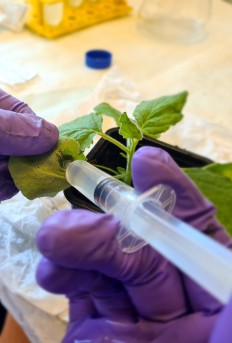Biosynthesis and regulationof volatile compounds
This research undertakes a comprehensive investigation into the genes responsible for the biosynthesis of volatile compounds, with a particular emphasis on terpenoids.
Terpenoids are a diverse class of organic compounds that play crucial roles in the life of plants and other organisms, contributing to their aroma, flavour, and defence mechanisms. Our research seeks to elucidate the evolutionary history of the genes involved in terpenoid biosynthesis and to understand the enzymatic mechanisms leading to the biosynthesis of terpenoids. We study these areas in all clades within the plant kingdom from mosses to roses.
|
A key focus of our investigation is on terpene synthases, which are vital enzymes that facilitate the conversion of precursors into a wide array of terpenoid products. By examining the structure and function of these enzymes, we aim to uncover the biochemical pathways that lead to terpenoid formation.
In addition to traditional biochemical approaches, our research employs advanced modelling techniques to analyse the three-dimensional structures of terpene synthases. Through this modelling, we aim to predict the specific products generated by these enzymes based on their structural characteristics. This predictive capability could significantly enhance our understanding of terpenoid diversity and function, offering insights into their potential applications in fields such as pharmacology, agriculture, and biotechnology. |
|
Ultimately, our work seeks to bridge the gap between genetic research, biochemical synthesis, and practical applications, contributing to a deeper understanding of terpenoids and their significance in nature.
|
|
|
|
Structural model of tamariscol synthase from liverwort Frullania dilatata created using AlphaFold Server and edited in Pymol |
Biosynthesis of geraniol in roses |






 Université Jean Monnet
Université Jean Monnet